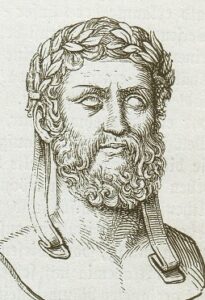Apologia Xenophon 012

Apología de Sócrates
(27-28)
Tabla de contenidos
Ἀπολογία Σωκράτους 012
[27] εἰπὼν δὲ ταῦτα μάλα ὁμολογουμένως δὴ τοῖς εἰρημένοις ἀπῄει καὶ ὄμμασι καὶ σχήματι καὶ βαδίσματι φαιδρός. ὡς δὲ ᾔσθετο ἄρα τοὺς παρεπομένους δακρύοντας, Τί τοῦτο; εἰπεῖν αὐτόν, ἦ ἄρτι δακρύετε; οὐ γὰρ πάλαι ἴστε ὅτι ἐξ ὅτουπερ ἐγενόμην κατεψηφισμένος ἦν μου ὑπὸ τῆς φύσεως ὁ θάνατος; ἀλλὰ μέντοι εἰ μὲν ἀγαθῶν ἐπιρρεόντων προαπόλλυμαι, δῆλον ὅτι ἐμοὶ καὶ τοῖς ἐμοῖς εὔνοις λυπητέον· εἰ δὲ χαλεπῶν προσδοκωμένων καταλύω τὸν βίον, ἐγὼ μὲν οἶμαι ὡς εὐπραγοῦντος ἐμοῦ πᾶσιν ὑμῖν εὐθυμητέον εἶναι. [28] παρὼν δέ τις Ἀπολλόδωρος, ἐπιθυμητὴς μὲν ὢν ἰσχυρῶς αὐτοῦ, ἄλλως δ᾽ εὐήθης, εἶπεν ἄρα· Ἀλλὰ τοῦτο ἔγωγε, ὦ Σώκρατες, χαλεπώτατα φέρω ὅτι ὁρῶ σε ἀδίκως ἀποθνῄσκοντα. τὸν δὲ λέγεται καταψήσαντα αὐτοῦ τὴν κεφαλὴν εἰπεῖν· Σὺ δέ, ὦ φίλτατε Ἀπολλόδωρε, μᾶλλον ἐβούλου με ὁρᾶν δικαίως ἢ ἀδίκως ἀποθνῄσκοντα; καὶ ἅμα ἐπιγελάσαι.
Perge ad initium paginae huius
Apologia Sōcratis 012
[27] Y después de haber hablado así, se salió, sin que con ningunas otras se pudieran refutar estas sus palabras. Sus ojos, su actitud, su paso conservaron la misma serenidad. Mas como se apercibiese de que los que le acompañaban se deshacían en lágrimas, les dijo: «¿Qué es esto? ¿por qué precisamente lloráis ahora? ¿No sabíais hace mucho tiempo que en el momento mismo del nacer pronunció la naturaleza mi sentencia de muerte?. Si yo muriera antes de tiempo, en medio de afluencia de bienes, fuera ello seguramente motivo de aflicción para mí y para los que me aman; pero si pongo fin a mi carrera, cuando no me esperan ya sino males, sólo habéis de ver en ello, es mi opinión, motivo de gozo para todos vosotros». [28] Estaba presente un tal Apolodoro, grandemente afecto a Sócrates, simple por lo demás, quien le dijo: «Sócrates, me es enteramente insoportable verte morir injustamente». A lo cual, se dice, que Sócrates contestó. poniéndole suavemente la mano en la cabeza: «Pero, Apolodoro, ¿preferirías que muriese justamente a que muera injustamente?». Y a la vez se sonreía.
Perge ad initium paginae huius
Apology of Socrates 012
[27] With these words he departed, blithe in glance, in mien, in gait, as comported well indeed with the words he had just uttered. When he noticed that those who accompanied him were in tears, “What is this?” Hermogenes reports him as asking. “Are you just now beginning to weep? Have you not known all along that from the moment of my birth nature had condemned me to death? Verily, if I am being destroyed before my time while blessings are still pouring in upon me, clearly that should bring grief to me and to my well-wishers; but if I am ending my life when only troubles are in view, my own opinion is that you ought all to feel cheered, in the assurance that my state is happy.” [28] A man named Apollodorus, who was there with him, a very ardent disciple of Socrates, but otherwise simple, exclaimed, “But, Socrates, what I find it hardest to bear is that I see you being put to death unjustly!” The other, stroking Apollodorus’ head, is said to have replied, “My beloved Apollodorus, was it your preference to see me put to death justly?” and smiled as he asked the question.
Perge ad initium paginae huius
Conversaciones en el Ātrium Philosophicum
EN CONSTRVCCION

EN CONSTRVCCION
Perge ad initium paginae huius
OFFICĪNA PHILOSOPHŌRVM ***
